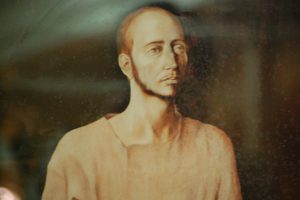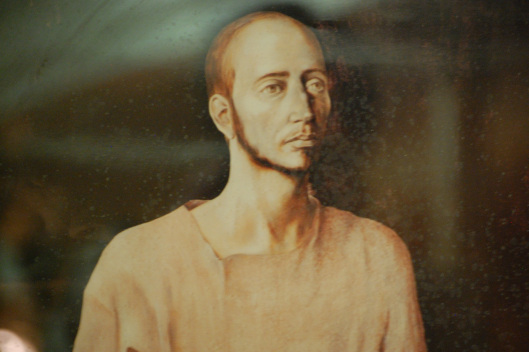
Ignatius of Loyola as a Young Man
Blessed are the pure in heart, for they will see God (Matthew 5:8).
Five hundred years ago in Loyola Castle of Spain, a boy named Inigo dreamed of becoming a sword-wielding soldier in mail, tights, and a bright red hat. He envisioned himself the champion and suitor of a noble lady.
As a young man, he became a court administrator and leader of men. Then as he led men defending a castle from French troops, a cannonball shattered his leg and wounded his dream.
The dream did not die easily. With unusual grace for invaders, the French took him back home to Loyola Castle for surgery to reconstruct the leg. Without anesthesia, the dream surged as he clenched his fists and quietly endured.
During convalescence, he found the bone poorly set. It made an unsightly lump, ruining his look in tights. So he insisted they open it up and shave down the bone as he quietly clenched his fists again.
Neither cannonball nor surgeon’s blade fazed the dream. Books did. In his long convalescence, he found no tales of adventure, conquest, or chivalry in Loyola Castle’s sparse library. So he grudgingly read two books, one on the life of Christ, the other an encyclopedia of saints.
The stories planted a new dream. The light of God’s love shone through them. Repentance from macho mischief only warmed the light. He dreamed of a life dedicated to God, forsaking all to love and serve God and God’s beloved. St. Francis, another reformed soldier, inspired him.
Yet, the old dream of knightly chivalry repeatedly returned. Rather than scolding himself for his difficulty letting it go, he attended carefully to his emotional responses to the two dreams.
Both the dream of courtly chivalry and the one of radical devotion and service to God pleased him. But he found a difference in the aftermath. Fantasies of chivalry left a dry, restless incompleteness. But the dream of discipleship invited peace that often stirred tears of gratitude.
So he discerned his calling as a new St. Francis. When strong enough, he set out for a monastery in Manresa where he struggled with depression, obsession, despair, and every demon of the spirit as he let go of the old vanities and ambitions, embracing humility and poverty of spirit with a vengeance.
Eventually, a spiritual companion advised him to keep his eye on the ball (God’s lovingkindness) and stop driving himself military-style toward an unattainable ideal of sainthood. His mission came clear to go into the world and make disciples. It came clearer as he documented the process of discerning God’s call he learned in his experience.
He wrote the Spiritual Exercises that, to this day, serve as an indispensable manual for spiritual directors. Recalling his experience discerning the dream of discipleship from that of chivalry, he counsels prayerful attention to consolations — the sense of peace or passion that suggests nearness to the warmth of God’s love — and to desolations — a sense of distance from God and from one’s true self, felt as dryness or an inner discord.
You can trust God’s guidance through these emotional experiences as long as you too keep your eye on the ball. That means keeping ever in mind that God loves you and invites you to love God and all God’s children.
Furthermore, the pure heart sees best. Indeed, as the Beatitude says, the pure in heart see God. In the first principle of the Exercises, Inigo described the way to purity of heart:
All the things in this world are gifts of God, presented to us so that we can know God more easily and make a return of love more readily. As a result, we appreciate and use all these gifts of God insofar as they help us develop as loving persons. But if any of these gifts become the center of our lives, they displace God and so hinder our growth toward our goal….We should not fix our desires on health or sickness, wealth or poverty, success or failure, a long life or a short one. For everything has the potential of calling forth in us a deeper response to our life in God. Our only desire and our one choice should be this: I want and I choose what better leads to God’s deepening his life in me. (Translated by David Fleming.)
Inigo won disciples by helping them work the Exercises. His disciples multiplied into the Society of Jesus, the Jesuits. When he graduated at a relatively late age from the University of Paris, Inigo chose a Latin name, Ignatius, for his diploma. To this day he is known as St. Ignatius of Loyola.
Ignatius remains a crucial teacher 500 years later. For moderns appeal less and less to authority and doctrine and ever more to experience to guide them. Ignatius offers wise guidance in experiencing and loving God in our busy daily round, full of distractions and decisions. He offers a way to purify our hearts, find our path, and ultimately, see the loving look of God.
Related Posts
Discernment: The Art of Really Living Your Faith
Examen Prayer: Catching Up with God at the End of the Day
Calling Out the Inner Enemy
Resources
- On the life of Ignatius
- Joseph N. Tylenda, S.J., tr., A Pilgrim’s Journey: The Autobiography of Ignatius of Loyola, Revised. (San Francisco: Ignatius Press, 2001).
- Ron Hansen, “The Pilgrim: Saint Ignatius of Loyola,” in George W. Traub S.J., ed., An Ignatian Spirituality Reader. (Chicago: Loyola Press, 2008), 24-44.
- On The Spiritual Exercises
- David L. Fleming, S.J., tr., Draw Me Into Your Friendship: The Spiritual Exercises: A Literal Translation & Contemporary Reading. (St. Louis: The Institute of Jesuit Sources, 1996).
- William A. Barry, S.J., Finding God in All Things: A Companion to the Spiritual Exercises of St. Ignatius. (Notre Dame, IN: Ave Maria Press, 1991).
- On Ignatian guidance for discernment
- Timothy M. Gallagher, O.M.V., The Discernment of Spirits: An Ignatian Guide for Everyday Living. (New York: Crossroad,, 2005). For his audio adaptation, Ignatian Discernment in Everyday Life: An Audio Course on Finding God in All Things, click here.
- Timothy M. Gallagher, O.M.V., Discerning the Will of God: An Ignatian Guide to Christian Decision Making. (New York: Crossroad, 2009).


I enjoyed reading your post and thanks for the bibliography.
Glad you enjoyed it. I hope readers like you gain a more in depth understanding through the suggested resources.